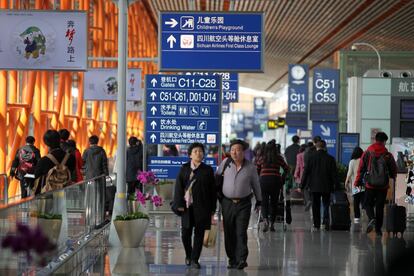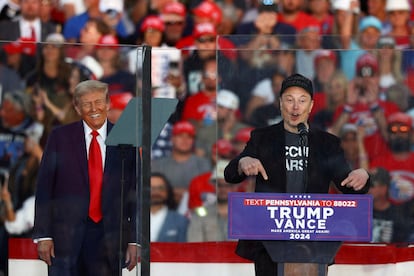When did we fall out of love with globalization? New rules break the traditional China-led pattern
Trade frictions, restrictions on foreign investment and tech wars have gained ground, and digital platforms are the undisputed winners


Large and medium-sized economies have begun to review the labels on their products. Made in China has become a headache for some governments, which no longer see it as safe to design at home and produce on the other side of the ocean. The grounding of the Ever Given in the Suez Canal in 2021 showed that the paralysis of a large cargo vessel can stunt the pace of the world economy.
The following years were not any better for globalization. Factory closures due to the Covid-19 lockdown left hundreds of shelves empty of electronic products. The Russian invasion of Ukraine shook up the European energy board, so accustomed to cheap energy from Moscow. The recent conflicts in the Middle East have rocked the fossil fuel market and for almost three years the rise in prices has punished most consumers in developed economies.
Some argue that the accumulation of global tensions is responsible for the growing distrust between governments, which are imposing tariffs on certain products or directly moving factories to closer and more ideologically similar countries. The World Trade Organization, in fact, recorded how the volume of trade in goods began to slow down in 2019, when a 0.1% drop was recorded, marking the first annual decline since 2009.

In this new gameplan, explains Amitendu Palit, a senior researcher at the Institute of Asian Studies at the University of Singapore, the issue of national security has taken on vital importance: “There remains a serious lack of trust among the world’s major powers, as well as in many of the middle powers and emerging markets, which is affecting the World Trade Organization’s rules-based trading system.”
The United States has declared open war on China in the field of sectors considered strategic, such as artificial intelligence or the development of next-generation microchips, in which the Asian giant is also demonstrating significant progress. The outgoing Joe Biden administration prohibited access to key technology for the manufacture of semiconductors by Chinese companies.
The cutting-edge technology sector has not been the only one shaken by the sanctions. European electric vehicle manufacturers are directly pointing the finger at the Beijing government for subsidising Chinese manufacturers, which is said to be lowering the prices of models arriving on the Old Continent. And the United States has directly banned the sale of plug-in vehicles throughout the country. “As these actions materialize, we will see a new phase of globalization, where global production landscapes and their geographies will be different from those of the past,” explains Palit. Everything indicates that this new landscape is already beginning to be constructed.
The decline in trade between the United States and China has given other countries the opportunity to participate in the global manufacturing chain, such as Mexico, Vietnam, the Philippines, Taiwan, or India, explains Clement Fuest, director of the Leibniz Institute for Economic Research (IFO). In 2023, the U.S. imported more goods and services from Mexico than from any other country in the world, displacing China for the first time in 21 years, according to data published by the U.S. Census Bureau.
The time of technology
But understanding the path of current globalization can be much more complex. Elena Pisonero, former Spanish ambassador to the OECD, argues that the digitalization of the economy has pushed the supply of services and the exchange of information as the new protagonists of world trade. Exports of services have increased by 60% in the last decade, reaching $7.9 trillion (7.5% of the world’s gross domestic product) in 2023. Although the market for physical goods remains larger, worth $24 trillion, its growth has been slower and remains stable as a percentage of GDP.
Pisonero points out that the arrival of new players, such as big tech companies, is changing the rules of the game. Represented by firms such as Meta, Amazon, and Google, the U.S. technology industry has been accumulating more and more power and influence. The current proximity of magnates such as Elon Musk and Mark Zuckerberg to the Trump administration projects the importance that big tech has gained in the highest spheres of world politics.

“They are now players who can define the rules and who have the same negotiating power as entire countries,” adds Pisonero, who believes that in order to stand out, Europe will have to learn to play on this terrain, adjusting to the new channels where the exchange of information is as important as the trade of goods.
Miguel Otero, a senior researcher at the Elcano Royal Institute, says that China does not intend to be left behind and has also opted for its own digital ecosystem, which in the last decade has given rise to important mass-use platforms such as TikTok, which faces a total ban by the U.S. government. Lawmakers and regulators in Washington have increasingly expressed concern that TikTok and its parent company, ByteDance, could put users’ personal data, such as location information, in the hands of the Chinese government.
Energy and inflation, the roots of the problem
There are those, such as Hosuk Lee, director of the European Centre for International Policy, a think tank in Brussels, who point in another direction. “I think both perspectives are wrong,” explains the economist specializing in international trade: “There is no predominant movement towards services and data, nor is globalization going backward just because Europe or the United States receives less from China. It is a very European way of looking at problems.”
For Lee, fluctuating energy prices and inflation are factors that have “naturally” hampered international trade, especially in the case of Chinese exports. “These are natural factors that can slow down the process of globalization, but not put an end to it.”
Despite his reading, Lee also believes that the geopolitical map has been strained by a series of events, but he qualifies that the West should stop worrying about China, “which is not really its main commercial rival.” Europe’s real adversary is the United States: “One has Airbus, the other Boeing; one assembles Volkswagen cars and the other Ford. On the other hand, China has not yet managed to build brands that can compete with these companies.”
The sanctions imposed by Washington and Brussels on Chinese brands, Lee explains, only motivates manufacturers to achieve technological autonomy much sooner: “The same thing happened with Japan 30 years ago and it had solid industrial development.”
“I don’t think we are experiencing deglobalization,” Palit concludes, “but rather globalization on different terms and conditions. The industries that will be most impacted by these changes will be those that countries consider vital to their long-term economic and security interests. This includes semiconductors, clean energy, electric vehicles, and solar panels.”
In this new scenario, Lee points out, the United States is trying to catch up while Europe continues to lag behind. “Europe must consider its participation in the world economy. For a long time, it had North America to defend it, China to do business with, and Russia to obtain energy from. It was not the best strategy, but it is the most comfortable for a region that does not want to wake up from a dream.”
Sign up for our weekly newsletter to get more English-language news coverage from EL PAÍS USA Edition
Tu suscripción se está usando en otro dispositivo
¿Quieres añadir otro usuario a tu suscripción?
Si continúas leyendo en este dispositivo, no se podrá leer en el otro.
FlechaTu suscripción se está usando en otro dispositivo y solo puedes acceder a EL PAÍS desde un dispositivo a la vez.
Si quieres compartir tu cuenta, cambia tu suscripción a la modalidad Premium, así podrás añadir otro usuario. Cada uno accederá con su propia cuenta de email, lo que os permitirá personalizar vuestra experiencia en EL PAÍS.
¿Tienes una suscripción de empresa? Accede aquí para contratar más cuentas.
En el caso de no saber quién está usando tu cuenta, te recomendamos cambiar tu contraseña aquí.
Si decides continuar compartiendo tu cuenta, este mensaje se mostrará en tu dispositivo y en el de la otra persona que está usando tu cuenta de forma indefinida, afectando a tu experiencia de lectura. Puedes consultar aquí los términos y condiciones de la suscripción digital.








































